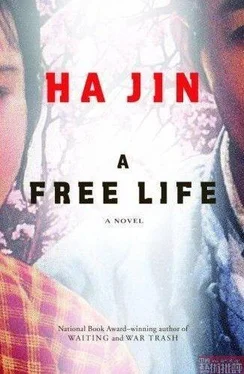On occasion Taotao still showed animosity toward Nan. One sentence he often hurled at him was "You were never there." Nan knew what he meant-the boy still resented Nan 's absence from his early childhood. Yet Nan would reply, "Who said I wasn't there? I was the first person who saw you coming out of your mahther. Your head appeared first, with sleek hair." That would exasperate his son more.
Without doubt, Taotao viewed Nan as a kind of rival in the household. Whenever possible, he'd strive to monopolize his mother's attention and love, interrupting Nan's conversations with Pingping or sitting between his parents, or pinning blame on Nan whenever something went awry. Nan told him to act his age. The boy was almost thirteen, five feet tall, but he wouldn't change. "You have Oedipus complex and may end up a mama's boy," Nan often told him. That would make matters worse. Enraged, Taotao would call him "douche bag." Nan didn't know this word, nor could he find it in his dictionaries. He assumed that it must be a slang neologism, too recent for lexicographers to pick up. He once asked his son how to spell it, but the boy wouldn't tell him.
Sometimes Nan wondered what it would have been like if he'd had a daughter instead of a son. Deep down, he'd have preferred a girl, who might have treated him with more affection and attachment, and who might have helped him more with the work at the restaurant-not like Taotao, who would feel ashamed of clearing tables in the presence of the kids he knew and would complain to his parents, "Haven't I been a servant boy long enough?" Nan wouldn't respond to that, though he felt Pingping had spoiled their son. If only they'd had a daughter.
IN THE SPRING of 1996 Pingping found herself pregnant. The expectation of a new arrival in the family agitated everyone. Taotao was furious and said his parents were outrageous. "I'm almost thirteen. Am I going to be an uncle of the baby?" he blustered.
Nan countered, "Once you go to college, we need anozzer child at home."
"I don't want any siblings."
Pingping remained silent. The boy seemed afraid that the new arrival would become the center of the family. "Selfish brat," said his father. "Shut the hell up!"
Nan throttled his impulse to yell back at his son. In fact, he was the only one in the family who was happy about Pingping's pregnancy, because he imagined that the baby might provide a new focus for his life. He wouldn't mind spending the rest of his years raising the child if it was a girl.
Unlike him, Pingping was frightened, for she was already forty and might not be able to give birth easily. Also, this wasn't like in China, where her parents, both doctors, could help her. Here she was alone and couldn't rely on Nan, who wasn't good at taking care of others. More worrisome, the medical expenses would be enormous since their health insurance covered only emergencies. What if she died in childbirth? Then Taotao would be motherless and Nan would be wretched too. There were so many risks to consider that she had gotten restless. She told Nan about her fear, but he replied, "Don't worry. Everything will work out fine. We have some extra money now and can afford to raise another child."
An ultrasound at the Norcross Medical Center showed it was a healthy baby, though it was too early to find out its sex. Somehow both Nan and Pingping had no doubt that it was a girl. From a tiny black box like a camera a nurse let the Wus hear the baby's heartbeat, which raced rapidly like a bird flapping its wings. "Very strong," Nan said, beaming as thin creases grooved the skin under his eyes.
Stacy, the nurse, told them, "Actually, the pulse is rather shallow, but it will get stronger as the baby grows." Her chubby fingers kept pressing Pingping's belly, which hadn't bulged out yet. The baby was just two months old.
Despite paying $236 for the checkup, Nan was elated. During the following days he and Pingping began thinking what name they should give the baby. Whatever they came up with, Taotao would say it sounded silly. Ignoring the boy's grouchiness, Pingping and Nan settled on "May," which is phonetically identical with the Chinese characters beauty and plum blossoms. Indeed, such a name was commonplace, but the plainness might make the child easy to raise. Back in China, especially in the countryside, parents often purposely gave babies nondescript names, even calling them Doggy or Donkey or Dolly, or just Kiddo or Lassie, so that ghosts might not notice and snatch them away.
Gradually Taotao cooled down, willing to accept a sister as a new member of their family, though his mother was still anxious. Sometimes Pingping was an insomniac at night, tossing in bed and thinking about all the unpredictable things. What if the baby turns out to be retarded or has a congenital illness? I'm already forty-anything like that can happen. What if I die in childbirth? That'll destroy Tao-tao and devastate Nan -our family will collapse. I won't worry about Nan, who can get along without me. If I'm dead, he might find another woman soon and might even go back to China to look for Beina. Although he says he's too tired to love anyone, I know him better than he knows himself-he could forget me and marry another woman soon after I'm gone. But I wouldn't begrudge him that. He deserves to go on with his life, to form a new family. What I cannot set my mind at ease about is that Taotao will be motherless. Nan loves him, I'm sure, but he doesn't know how to take care of a child. Not to mention the baby, who will need nursing and looking after. Nan can be a good provider but can't be a true family man. He was born to be a writer and scholar, though he can be neither here. That's what makes him angry all the time. If only my parents were here! They could help me figure things out and make arrangements. With them around I wouldn't mind having two more babies. I love children; so does Nan. We should've had a large family. That would make him happy, and with a girl baby he'll definitely try to be a good, indulgent father. Well, I'm not so sure. It seems like he can't live without making himself and others suffer. Still, I love him. He's a good man for all his shortcomings, and he can't wait to see the new baby. Never is he worried about the difficulties I might get into. Always absentminded like that. You may be able to remove a mountain, but you can't change a man's nature. Stop thinking so many negative thoughts. Get some sleep. Tomorrow is Monday, and there'll be a lot of work for the buffet.
In the morning Pingping's face would be sickly and bloated. She also retched a lot, convulsing with the dry heaves. There were many things her stomach wouldn't digest, such as cheese, tofu, spinach, fish, chicken. Yet she got hungry so frequently that she ate seven or eight meals a day. "This baby is a monster," she kept saying.
Nan tried to calm her down. He wouldn't let her do any heavy work in the restaurant. All of a sudden his life seemed to have a purpose, a center, and he felt invigorated. He was grateful for a second opportunity, because he hadn't helped his wife much in raising Tao-tao. This time he was determined to be a better father.
NAN wrote four short poems in English. He was pleased with them and wondered if he should show them to Dick. He decided not to for the time being; instead, he mailed them to Sam Fisher and Edward Neary, since both poets had told him to send them his work. He hoped they would comment on his poems and ideally help him publish one or two.
A few months earlier Dick had suggested that Nan write a memoir. Nan was bemused by the idea and shook his head, saying he had no such intention and couldn't imagine being a memoirist. To him, such a book should be written by someone who had experienced something extraordinary. But Dick said, "Your life can be a very interesting subject according to what I've heard." Still, Nan didn't want to attempt that. Besides, a book of prose would demand a lot of the author-a long-lasting concentration and total immersion in the writing. It meant he'd have to live as a full-time writer for a year or two, a luxury he couldn't afford. He'd better focus on poetry, which mainly needed short bursts of energy.
Читать дальше












